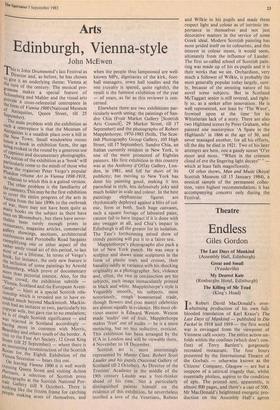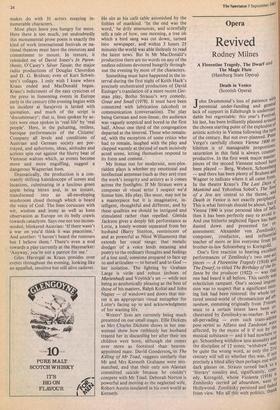Theatre
Endless
Giles Gordon
The Last Days of Mankind (Assembly Hall, Edinburgh) Great and Small (Vaudeville) My Dearest Kate (Roxburghe Hotel, Edinburgh) The Killing of Mr Toad (King's Head) Tn Robert David MacDonald's over- whelming production of his own full- blooded translation of Karl Kraus's The Last Days of Mankind — published in Die Fackel in 1918 and 1919 — the first world war is envisaged from the viewpoint of Viennese cafe society. The entire action un- folds within the confines (which don't con- fine) of Terry Bartlett's gorgeously recreated restaurant. The four hours presented by the International Theatre of the Gorbals — otherwise known as the Citizens' Company, Glasgow — are but a soupcon of a satirical tragedy that, whilst essentially plotless, aspires to the condition of epic. The printed text, apparently, is almost 800 pages, and there's a cast of 500. Mr MacDonald's heightened energetic pro- duction on the Assembly Hall's apron makes do with 31 actors essaying in- numerable characters.
Most plays leave you hungry for more. Here there is too much, yet undoubtedly this monumental prose poem is exactly the kind of work international festivals or na- tional theatres must have the resources and commitment to mount. In texture, it reminded me of David Jones's In Paren- thesis; O'Casey's Silver Tassie; the major radio productions of Douglas Cleverdon and D. G. Bridson; even of Kurt Schwit- ters's collages. I only wish I knew where Kraus ended and MacDonald began. Kraus's indictment of the easy cynicism of the press in fomenting events in Europe early in the century (the evening begins with an incident at Sarajevo) is larded with quotation, and much of the script is `documentary': that is, lines spoken by ac- tors were once spoken in 'real life' by 'real people'. Here, in the pulsating, restless, baroque performances of the Citizens' Company all levels and conditions of Austrian and German society are por- trayed, and aphorisms, ideas, attitudes and actions spin out against the blurry beat of Viennese waltzes which, as events become more and more engulfing, suggest a dangerous Wagnerian hum.
Dramatically, the production is a con- stantly shifting kaleidoscope of scenes and locations, culminating in a luscious green apple being bitten and, in an instant, transformed into an all-enveloping mushroom cloud through which is heard the voice of God. The lines coruscate with wit, wisdom and irony as well as keen observation as Europe on its belly crawls towards cataclysm. Says one not too incom- moded, blinkered Austrian: 'If there wasn't a war on you'd think it was peacetime.' And another: 'I haven't heard the rumours but I believe them.' There's even a nod towards a play currently at the Haymarket: 'Anyway, you're not a patriot for me.'
Giles Havergal as Kraus presides over events throughout the evening, looking like an appalled, sensitive but still alive cadaver. He sits at his cafe table astonished by the foibles of mankind. 'In the end was the word,' he drily announces, and scornfully tells a tale of how, one morning, a tree on which a bird sang was cut down, turned into newspaper, and within 3 hours 25 minutes the world was able listlessly to read the latest news. But in Mr MacDonald's production there are no words on any of the endless editions devoured hungrily through- out the evening by most of the characters.
Something must have happened in the in- terval during the first night of Keith Hack's precisely orchestrated production of David Essinger's translation of a more recent Ger- man play, Botho Strauss's wry comedy, Great and Small (1978). It must have been connected with lubrication (alcohol) or communication (conversation). The play being German and non-linear, the audience was vaguely sceptical and bored in the first half. About one third of the congregation departed at the interval. Those who remain- ed, with the exception of some critics who had to remain, laughed with the play and clapped warmly at the end of each incisively acted scene, letting themselves respond to its form and content.
My litmus test for modernist, non-plot- ridden plays is whether my emotional and intellectual antennae (such as they are) trust the work's integrity and artistry as it comes across the footlights. If Mr Strauss were a composer Or visual artist I suspect we'd lionise him. His play, like most, may not be a masterpiece but it is imaginative, in- telligent, thoughtful and different, and by these qualities we should be intrigued and stimulated rather than repelled. Glenda Jackson gives a deeply felt performance as Lotte, a lonely woman separated from her husband (Barry Stanton, reminiscent of and as powerful as Nicol Williamson) that extends her vocal range: that metalic dredger of a voice lends meaning and poetry to the ordinary thoughts and feelings of a lost soul, someone prepared to face up to and articulate — to herself and to God her isolation. The lighting by Graham Large is virile and robust (echoes of Marienbad) and Voyteck's set — while not being as aesthetically pleasing as the best of those of his masters, Ralph Koltai and John Napier — of windows and doors that mir- ror is an appropriate visual metaphor for Lotte's facing up to and acknowledgment of her wasting life.
Writers' lives are currently being much presented on our small stages. Ellie Dickens as Mrs Charles Dickens shows in her one- woman show how ruthlessly her husband treated her in discarding her after their ten children were born, although she comes over more as footstool than heaven-
appointed mate. David Gooderson..in The Killing of Mr Toad, suggests similarly that
Mr and Mrs Kenneth Grahame were mis- matched, and that their only son Alastair committed suicide because he couldn't compete with Mr Toad. Deborah Norton is powerful and moving as the neglected wife, Robert Austin insulated in his own world as Kenneth.



































 Previous page
Previous page